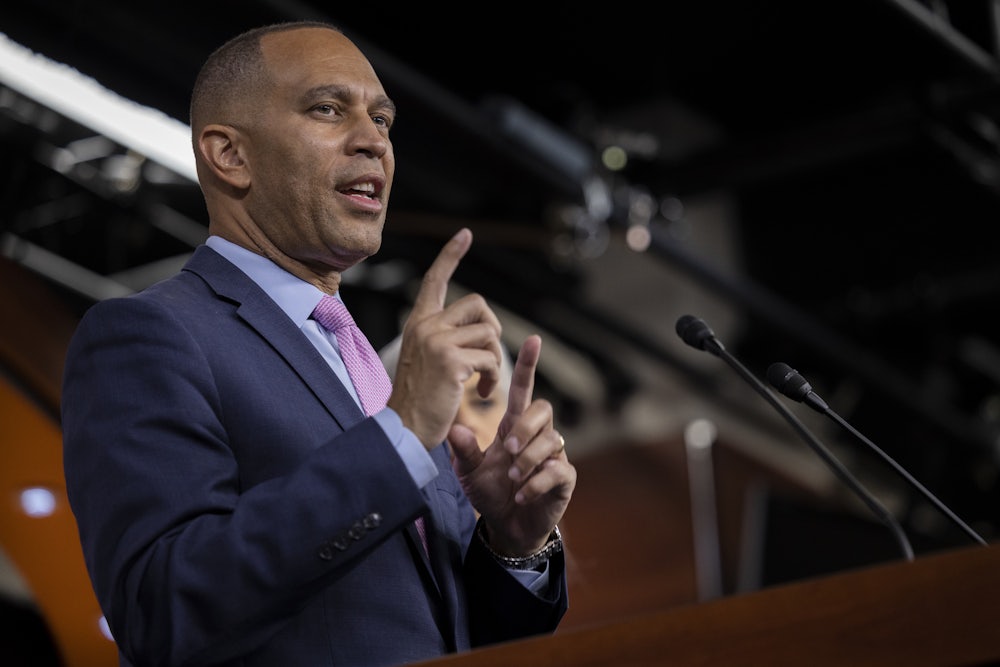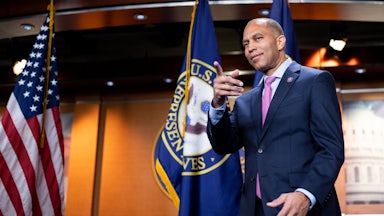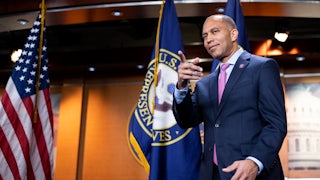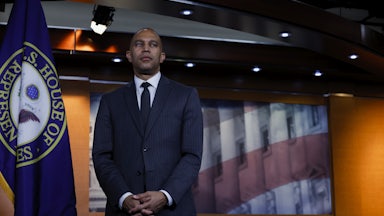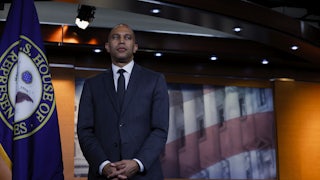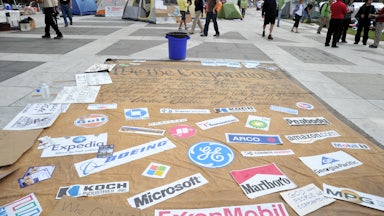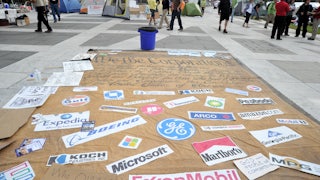On Wednesday, not long after New York’s Representative Hakeem Jeffries was elected to replace House Speaker Nancy Pelosi as the Democratic leader, the midday vibe in the House of Representatives palpably shifted to “power grab.” Within hours of Jeffries’s big win, an amendment by Representatives Suzan Delbene, Brad Schneider, and Mark Pocan passed the House that empowered the newly minted leader-designate to unilaterally nominate the next chair of the Democratic Congressional Campaign Committee, or DCCC, rather than hold a caucus vote in an open election for the role.
“The rule is bogus,” said Alexandria Ocasio-Cortez, who told The New Republic of the amendment to empower Jeffries to pick the next DCCC chair. The New York representative is not alone in her concern over the concentration of power with the party leader. Progressive members of the informal “Squad” caucus such as Ocasio-Cortez and Representative Ilhan Omar don’t pay DCCC dues like most House Democrats, choosing instead to fund candidates through other means. “I think it is better to keep it as an elected position. Then we get to have a voice on who ends up being in that position,” Omar told Politico’s Nicholas Wu last month.
The DCCC (or as it’s known on the Hill, the “D-trip”) has been the official election campaign arm of House Democrats since 1866. Committee chairs serve two-year terms and can command election campaign war chests in the tens of millions of dollars, as well as dozens of full-time campaign operatives and consultants focused on House races.
House Democrats suffered something of an embarrassment on election night last month after the then–DCCC Chair Sean Patrick Maloney lost his own House reelection bid to New York state assemblyman and political consultant Mike Lawler. Maloney’s defeat—which came after he jumped into a new district, forcing out another arguably better-positioned Democratic incumbent, after the redistricting ambitions of state Democrats collapsed in a chaotic heap—was the cherry atop the New York Democratic Party’s failure sundae. The National Republican Congressional Campaign, or NRCC—the DCCC’s rival elections committee—went all in against Maloney for a rare mantlepiece win in what most agree was a huge underperformance in the midterms by the House GOP.
Republicans won back the House majority, but just barely, after party leaders and election forecasters had predicted a huge GOP showing for months leading up to Election Day. This is how the game is played: Winning the majority in the following election cycle is the top job for any House minority leader. For Jeffries, this means picking a DCCC chair by February 15 who can do what Maloney couldn’t—win House seats for the Democrats in 2024.
Jeffries would not reveal his choice for DCCC chair when asked by The New Republic at Wednesday afternoon’s House votes. A Jeffries aide scoffed at the question as the leader-designate passed through the metal detectors and into the House chamber.
Two candidates—both four-term House Democrats from California—have emerged as the front-runners in a chairmanship race that could get ugly in coming weeks. Indeed, the gloves are already coming off between Representatives Ami Bera from Sacramento and Tony Cárdenas from Los Angeles, as whisper campaigns resurface scandals in the press.
Cárdenas, who is out this week with Covid, saw his links to a controversial Southern California pornographer resurface this morning in Politico and National Review. Meanwhile, Bera’s enduring having his family’s not-so-illustrious past redredged for public consumption: In 2016, his father was sentenced to a year in prison for campaign finance violations after he was caught in a money-laundering scheme that provided campaign contributions to his son’s first two congressional campaigns in 2010 and 2012.
“Neither one of those guys are any good,” said a Hispanic Caucus member who declined to be named for this story. The New Republic asked eight Hispanic Caucus members to confirm reports that the caucus was backing Cárdenas. Only Representatives Ruben Gallego and Chuy Garcia confirmed their support for Cárdenas on the record, but there was a general feeling of resignation among Latino Democrats that Jeffries would inevitably pick Bera to chair the DCCC.
“Tony and I are friends. Obviously we’re both Californians, were classmates, came to Congress together, and I think it’s been a friendly race,” Bera told The New Republic. “With the new leadership team coming in, you really can make the argument that this D-trip chair should be a reflection of their values, their strategy, and be on the same page,” Bera continued.
Asked what his top priority would be as DCCC chair, Bera didn’t waffle: It was head count. “We have some really talented staff over there that just had a really good election night,” he said. “Let’s go evaluate those staff. Let’s see who we can retain and let’s build off the momentum that we already have.”
Cárdenas, through a spokesperson, declined to comment on this story.
